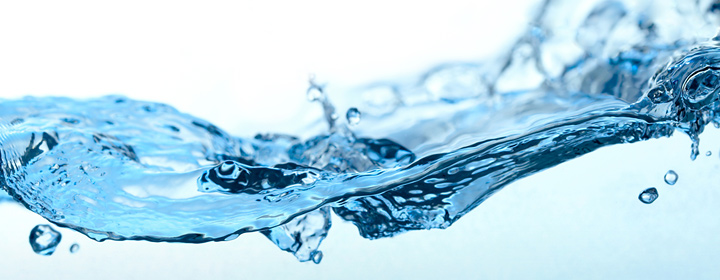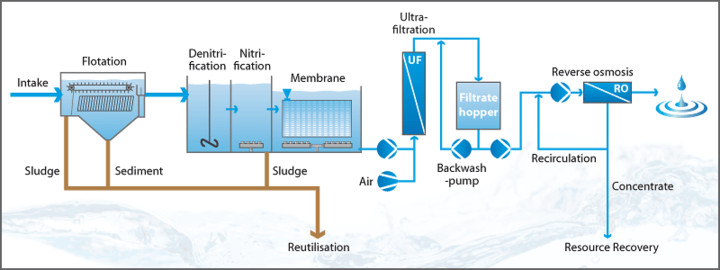
WATER SYSTEMS ENGINEERING
Engineering the molecule of life
The group “Water Systems Engineering“, led by Dr. Karl Glas, is focusing on the interface of water, energy and environment with a special emphasis on the needs of the beverage and food industry. Within this highly complex context, a wide spectrum of specific issues (drinking water, waste water, process engineering, microbiology, water as food, sensory) is studied in various research projects. These investigate subjects like the management of energy or material processes and specific issues of microbiological or industrial hygiene. Theoretical as well as technical solutions ensure the maximization of energy and resource efficiency of single process steps or complex process chains and provide alternatives for established processes while minimizing the impact on the environment. Sophisticated methods are used for the simulation of chemical-physical processes, for the analysis of novel materials, and for the modelling of composite facilities and multi-parametric process structures. The group organizes the annual seminar series “Weihenstephaner Seminar für Wassertechnologie” (see HERE).
Cooperations
TUM Water Cluster
Water research at Technical University Munich
HyMo_ME project
Hybrid modelling and prognosis for the energy and resource demands of the beverage industry
MiPAq project
Microparticles in the aquatic environment and in foodstuffs – are biodegradable polymers a conceivable solution to the "microplastic problem"?
Selected Publications
Karina Haro Carrasco, Egon Götz Höfgen, Dominik Brunner, Konstantin B. L. Borchert, Berthold Reis, Christine Steinbach, Martin Mayer, Simona Schwarz, Karl Glas, Dana Schwarz. Removal of Iron, Manganese, Cadmium, and Nickel Ions Using Brewers’ Spent Grain. Polysaccharides 2022. 3. 2. 356-379. doi.org/10.3390/polysaccharides3020021.
Raik Martin Bär, Sebastian Schmid, Michael Zeilmann, Joachim Kleinert, Karsten Beyer, Karl Glas, Tobias Voigt. Simulation of Energy and Media Demand of Batch-Oriented Production Systems in the Beverage Industry. Sustainability 2022, 14(3), 1599. doi.org/10.3390/su14031599.
Jana Weisser, Teresa Pohl, Michael Heinzinger, Natalia P. Ivleva, Thomas Hofmann, Karl Glas. The identification of microplastics based on vibrational spectroscopy data – A critical review of data analysis routines. Trends in Analytical Chemistry 2022, 148, 116535. doi.org/10.1016/j.trac.2022.116535.
Darena Schymanski, Barbara E. Oßmann, Nizar Benismail, Kada Boukerma, Gerald Dallmann, Elisabeth von der Esch, Dieter Fischer, Franziska Fischer, Douglas Gilliland, Karl Glas, Thomas Hofmann, Andrea Käppler, Sílvia Lacorte, Julie Marco, Maria EL Rakwe, Jana Weisser, Cordula Witzig, Nicole Zumbülte & Natalia P. Ivleva. Analysis of microplastics in drinking water and other clean water samples with micro-Raman and micro-infrared spectroscopy: minimum requirements and best practice guidelines. Anal Bioanal Chem 2021. doi.org/10.1007/s00216-021-03498-y
Sarah Brunschweiger; Vera Kranich; R. Haseneder; Thomas Hofmann; Karl Glas. Key factors of brewery wastewater influencing treatment efficiency and power output of microbial fuel cells. Brewing Science 2021, 74, pp. 71-81. doi.org/10.23763/BrSc21-06brunschweiger
Jana Weisser, Irina Beer, Benedikt Hufnagl, Thomas Hofmann, Hans Lohninger, Natalia P. Ivleva and Karl Glas. From the Well to the Bottle: Identifying Sources of Microplastics in Mineral Water. Water 2021, 13(6), 841. doi.org/10.3390/w13060841
S. Brunschweiger, L. Hörner, T. Hofmann, K. Glas. Microbial fuel cells for brewery wastewater treatment – efficiency requirements and treatment performance. 2021. Brewing Science, 47, 27-38. doi.org/10.23763/BrSc21-02brunschweiger
Marcus Verhuelsdonk, Karl Glas, Harun Parlar. Long-Term Operation of a Pilot-Scale Membrane Bioreactor Treating Brewery Wastewater: Relaxation as a Method for Detection of Membrane Fouling. Journal of Environmental Management 2021, 147(4): 04021005. doi.org/10.1061/(ASCE)EE.1943-7870.0001862.
Marcus Verhuelsdonk, Karl Glas, Harun Parlar. Economic evaluation of the reuse of brewery wastewater. Journal of Environmental Management 2021, 281, 111804. doi.org/10.1016/j.jenvman.2020.111804
Sarah Brunschweiger, Thomas Hofmann, Karl Glas. Industrial wastewater treatment with simultaneous energy recovery using microbial fuel cells – a review. Brewing Science 2020, 73, pp. 111-125. doi.org/10.23763/BrSc20-15brunschweiger
Mohammed S. M. Al-Azzawi, Simone Kefer, Jana Weißer, Julia Reichel, Christoph Schwaller, Karl Glas, Oliver Knoop and Jörg E. Drewes. Validation of Sample Preparation Methods for Microplastic Analysis in Wastewater Matrices—Reproducibility and Standardization. Water 2020, 12, 2445. doi.org/10.3390/w12092445
Christian von Heynitz, Manuel Stecker, Thomas Hofmann, Karl Glas. A Novel Dry Hopping Technology: Kinematic Modelling of a Planetary Rotating Bed Reactor. BrewingScience 2020, 73. 3. 68-76. doi.org/10.23763/BrSc20-09heynitz.
Brunschweiger, S.; Ojong, E. T.; Weisser, J.; Schwaferts, C.; Elsner, M.; Ivleva, N. P.; Haseneder, R.; Hofmann, T. & Glas, K. The effect of clogging on the long-term stability of different carbon fiber brushes in microbial fuel cells for brewery wastewater treatment, Bioresource Technology Reports, Elsevier BV, 2020, 100420
Von Der Esch, E.; Lanzinger, M.; Kohles, A.J.; Schwaferts, C.; Weisser, J.; Hofmann, T.; Glas, K.; Elsner, M.; Ivleva, N.P. Simple Generation of Suspensible Secondary Microplastic Reference Particles via Ultrasound Treatment. Frontiers in Chemistry, section Analytical Chemistry; Manuscript ID: 485011, 2020
Walsh, K.; Mayer, S.; Rehmann, D.; Hofmann, T.; Glas, K. Equilibrium Data and its Analysis with the Freundlich Model in the Adsorption of Arsenic(V) on Granular Ferric Hydroxide. Separation and Purification Technology; Volume 243, 2020, 116704
Singelmann, A.; Brunschweiger, S.; Glas, K.; Tabu Ojong, E.; Haseneder, R. Mikrobielle Brennstoffzellen zur Behandlung von Brauereiabwasser. Brauwelt, Nr. 3, 2020, S. 62-64
Zotz, M.; Glas, K. Modelling of ClO2-decomposition in Hot Water Systems, BrewingScience 2017, 70, 51-56.
Rose, P.; Hager, S.; Glas, K.; Rehmann, D.; Hofmann, T. Coating techniques for glass beads as filter media for removal of manganese from water. Water Sci Technol Water Supply 2017, 17 (1), S. 95–106. DOI: 10.2166/ws.2016.116.
Verhülsdonk, M.; Glas, K. Comparative Investigation on the Influence of Fouling and Scaling on the Membrane Filtration of Waste Water. BrewingScience 2012, 65, 53-59.
Heim, C.; Glas, K. Ozone I: Characteristics/Generation/Possible Applications. BrewingScience 2011, 64, 8-12.
Verhülsdonk, M.; Glas, K. Introduction to the Growth and Modelling of Biofilms in Ultrafiltration and Reverse Osmosis Plants. BrewingScience 2011, 64, 41-45.
Heim, C.; Ureña de Vivanco, M.; Rajab, M.; Glas, K.; Horn, H.; Helmreich, B.; Letzel, T. Ozone II: Characterization of In Situ Ozone Generation Using Diamond Electrodes. BrewingScience 2011, 64, 83-88.
Team members
Name |
Position |
Durchwahl |
|---|---|---|
| Dr.-Ing. Glas, Karl | Head scientist | 2356 |
| Brunner, Dominik | Scientific assistant/ PhD candidate | 2350 |
| von Heynitz, Christian | Scientific assistant / PhD candidate | 2357 |
| Oesinghaus, Helge | Scientific assistant / PhD candidate | 4267 |
| Kranich, Vera | Scientific assistant / PhD candidate | 2358 |
| Bähr, Gudrun | Chemical-technical assistant | 4270 |
Contact
AG Wassertechnologie
Maximus-von-Imhoff-Forum 2
85354 Freising
Germany
Tel.: +49 8161 71 2356
Fax: +49 8161 71 5362
